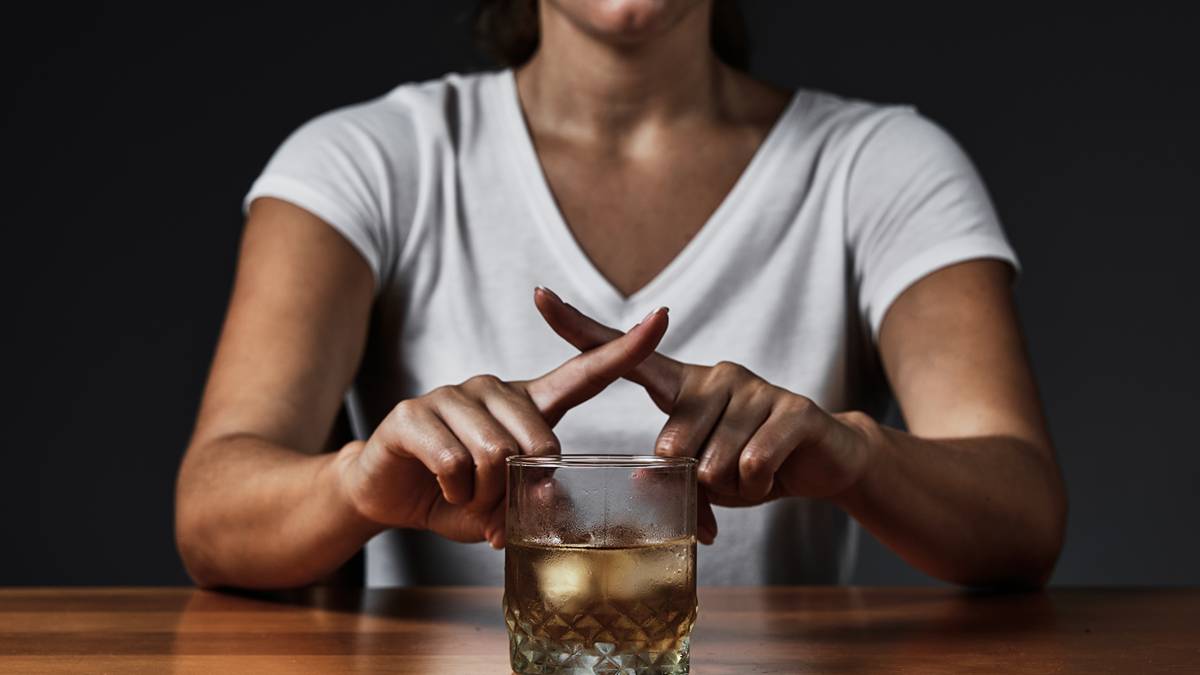Here’s how your body and mind change after you stop drinking for a month (or longer)

Thinking about cutting down on the grog? Here's some reasons why it might be a good idea. Pic: Getty Images
Skipped Dry July or Sober September? Let this list of health benefits spark inspiration for a month (or more) of cutting your alcohol intake.
Words by Hayley Hinze for Body and Soul
Alcohol is a big part of Australian culture, yet it’s no secret that drinking isn’t great for our health.
But thanks to the ‘sober curious’ trend and a growing range of non-alcoholic beverages that actually taste good, it’s becoming more mainstream to cut down or quit drinking.
“When we consume alcohol, it metabolises and (our body) breaks it down into a product called acetaldehyde, which is classed as a carcinogen,” Alcohol and Drug Foundation spokesperson Eleanor Costello says.
This is a potential problem as a carcinogen is a substance that can cause cancer.
Besides being linked to increased cancer risk, Costello says alcohol can also increase your risk of chronic disease, and contribute to a bunch of short- and long-term health issues.
Whether you’re planning a health kick or wanting to try sobriety, these are the health benefits you can expect to notice after one month of no alcohol.
7 health benefits of quitting alcohol for a month

#1. Better sleep
The sedative effect of alcohol might help you get to sleep sooner, but experts say it will disrupt the quality of your sleep.
“Alcohol disrupts REM sleep, so making changes to alcohol use helps people to feel more rested,” Hello Sunday Morning research manager Dr Katinka van de Ven says.
Even a low dose of alcohol can suppress REM sleep and reduce its duration.
REM sleep is important for brain and body recovery, according to Costello, so cutting alcohol can help you get the restful sleep you need.
“Poor sleep has all these knock-on effects to, over a lifetime, greatly increase your risk of chronic disease,” Costello adds.
#2. More energy
Better sleep equals more energy – but Costello says without alcohol, your body is also spared from energy-depleting side effects such as dehydration and inflammation.
Alcohol is a diuretic, which means it promotes water and electrolyte loss (hence the need to wee more when you’ve been drinking alcohol).
It also triggers inflammation, which can reduce cellular energy.
#3. Healthier-looking skin
Alcohol consumption can wreak havoc on your skin – it can cause rashes and flushing, and can worsen skin conditions such as rosacea and psoriasis.
Dr van de Ven says not drinking for a month can be beneficial for your complexion.
“Reduced inflammation and improved hydration can result in clearer skin,” she says.
#4. Weight loss
“Alcohol is energy-dense and often linked to overeating, so removing it can lead to noticeable weight changes,” Dr van de Ven says.
And it’s not just sugary cocktails and creamy liqueurs that are secretly increasing your daily kilojoule intake – Costello agrees that alcohol can change our appetite and trigger cravings for certain unhealthy foods.
“People often will crave salty and fatty foods when they drink, or things they might not normally eat in their diet,” Costello notes.
#5. Better heart health
After just one month without alcohol, blood pressure can reduce by 6 per cent, while insulin resistance can reduce by 25 per cent.
“Even one month off can lead to measurable improvements in cardiovascular and metabolic health,” Dr van de Ven says.
These health markers play a significant role in cardiovascular health – keeping them in check is important to help reduce your risk for heart attack and stroke.
#6. A happier liver
When we drink alcohol, our liver has to work hard to break it down.
If you drink more than your liver can handle, it can lead to a build-up of fat – which causes inflammation.
“After a month without alcohol, the liver starts to recover, with fat levels and inflammation decreasing within weeks,” Dr van de Ven says.
#7. Better mental health
‘Hangiexty’ isn’t just a buzzword. Costello says alcohol can heighten feelings of stress and anxiety.
“After a night out, you might wake up feeling anxious or worried, which is caused partly because of the chemical changes in our brain when we drink,” she explains.
Quit drinking, and you’re more likely to wake up feeling cool, calm and collected.

What are the long-term benefits of quitting alcohol?
“The longer someone stays alcohol-free or reduces their drinking, the more their risk of chronic disease continues to decline,” Dr van de Ven says.
She says these are some of the long-term health benefits of a sober lifestyle:
After six months:
- Reduced inflammation
- Improved gut health
- Ongoing improvements in mental health, memory and immune function
A year:
- Reduced risk of alcohol-related cancers
- Reduced risk of cardiovascular disease
- Reduced risk of liver disease
- Sleep, focus and mood tend to stabilise and improve further
After five years:
- Significant drop in risk of liver disease, cancer, stroke and heart disease (for those who were drinking heavily)
- Better brain health
- Healthier ageing
What are the benefits of reducing your alcohol intake?
Quitting alcohol is the gold standard for your health. But if that’s out of reach, Dr van de Ven says simply reducing your intake comes with some benefits too.
Reducing alcohol intake to within the drinking guidelines can still lead to (health) improvements, especially for people who were previously drinking at risky levels,” she says.
Australian guidelines recommend we have no more than 10 standard drinks per week, and no more than four standard drinks in one day.
“The more frequently and heavily someone drinks, the more noticeable the benefits of cutting back or stopping will likely be,” Dr van de Ven adds.
“That said, even light to moderate drinkers can experience positive changes after reducing or quitting, particularly in areas like sleep, energy and mood.”
After a month of reducing your alcohol intake to the guidelines, Dr van de Ven says you may notice:
- Better sleep
- Improved energy and focus
- Fewer hangovers and mood swings
- Mild weight loss
- A drop in blood pressure and liver enzyme levels
How to quit alcohol
“For people who are looking to cut back, take a break or stop drinking altogether, services like Hello Sunday Morning offer free, confidential and 24/7 support through digital tools, peer connection and non-judgmental care navigation,” Dr van de Ven says.
It’s also a good idea to check in with your GP or health professional, especially if you’re used to regular drinking.
“If you drink every day, or nearly every day, you may feel worse for a week or so before you start seeing benefits as your body adjusts to the reduced alcohol,” Dr van de Ven says.
This article originally appeared on BodyandSoul.com.au as Here’s how your body and mind change after you stop drinking for a month (or longer).
Related Topics

UNLOCK INSIGHTS
Discover the untold stories of emerging ASX stocks.
Daily news and expert analysis, it's free to subscribe.
By proceeding, you confirm you understand that we handle personal information in accordance with our Privacy Policy.








